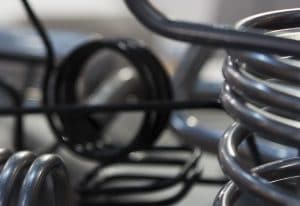 By making electrical thermal management easier and more predictable in many cases, heat exchangers have been an important development in the advancement of modern technology. Companies that create heat exchangers have benefited, as well, by using that technology to optimize the heat exchanger manufacturing process. For example, innovations such as in-house manufacturing capabilities and rapid 3D printing help streamline the design, testing, and creation of heat exchangers to make manufacturing them even more efficient.
By making electrical thermal management easier and more predictable in many cases, heat exchangers have been an important development in the advancement of modern technology. Companies that create heat exchangers have benefited, as well, by using that technology to optimize the heat exchanger manufacturing process. For example, innovations such as in-house manufacturing capabilities and rapid 3D printing help streamline the design, testing, and creation of heat exchangers to make manufacturing them even more efficient.
Collaborative analysis and design
Technology comes in all shapes and sizes, and even similar systems may have different operational and thermal management requirements. For heat exchangers to perform optimally, they must meet the specific requirements of the given application, which requires a comprehensive analysis involving a team of engineering and thermal management experts. This will help determine exactly what type of heat exchanger is most appropriate (such as heat pipe or cold plate, ambient or below-ambient, etc.).
Feasibility studies
After determining the type of heat exchanger that’s most appropriate and creating a series of initial design concepts, the next step is to test the feasibility of the design. This includes state-of-the-art simulation and testing of each of the design’s components to ensure their optimal function. The results of feasibility studies give experts the data they need to determine what aspects of the heat exchanger’s design need to be eliminated or adjusted.
Rapid 3D prototyping
Before manufacturing a heat exchanger, the final step of the analysis process is to create rapid 3D prototypes that can be tested in a real-world setting. Rapid prototypes of tools and components can be printed according to the design’s requirements, and then tested to ensure an optimal fit and to guarantee the heat exchanger’s effectiveness. For more information about how to optimize heat exchanger manufacturing, call Noren Thermal Solutions in Taylor, TX, at 866-936-6736.







